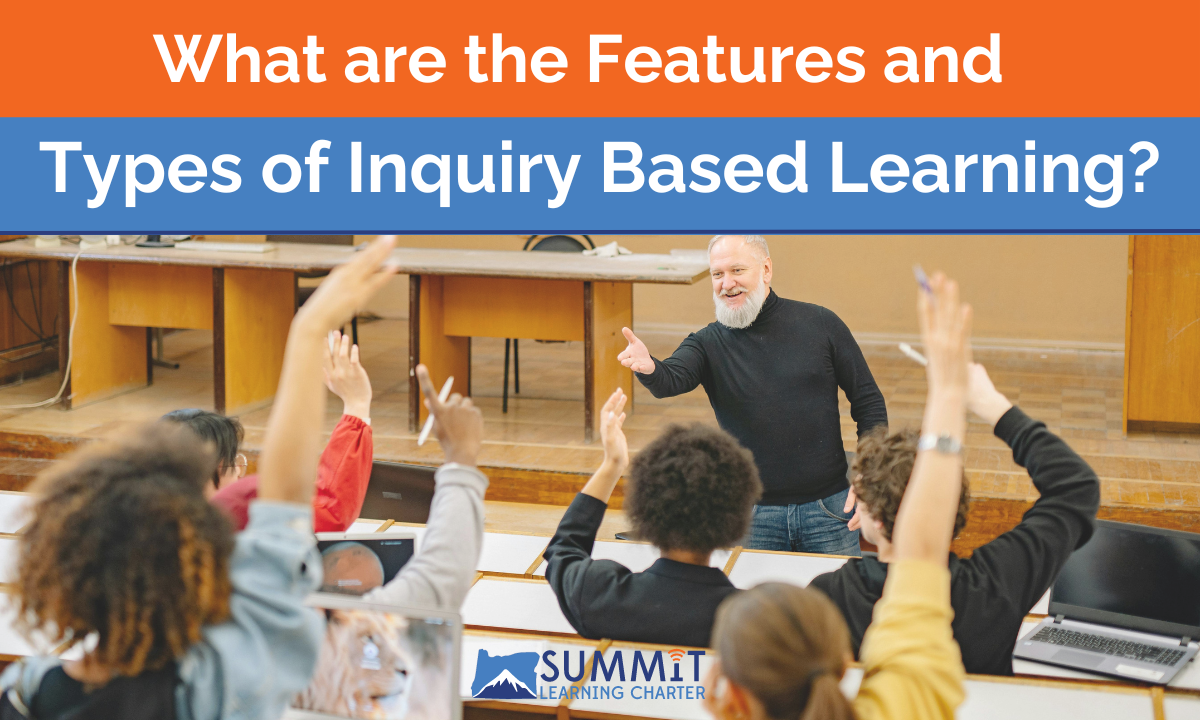
What are the Features and Types of Inquiry Based Learning?
Inquiry based learning is an educational approach that emphasizes active participation from students. Instead of passively receiving information presented by a teacher, inquiry based learning encourages students to ask questions, think critically, conduct research, and actively engage with the topic.
Asking questions and seeking answers is a fundamental skill, and in many cases it facilitates learning even more effectively than careful listening. Inquiry based learning can be used in both in-person and virtual schools and across a variety of subjects.
Key Features of Inquiry Based Learning
The primary difference between traditional and inquiry based learning is that the latter is focused on promoting active participation from students.
There are many ways that inquiry based learning can be applied, from science experiments, to classroom debates and discussions, to group projects. But there are some core aspects of the learning method that remain the same.
Here are a few key components of inquiry based learning:
- Student-driven: Students take a proactive role, often leading the learning process by choosing how they want to explore a given topic.
- Question-focused: Learning is driven by questions posed by the teacher and the students; questions act as a catalyst for research and discussion.
- Research-based: Students engage in active research, experiments, and hands-on activities as they investigate questions and seek answers and solutions.
- Teacher-guided: Rather than presenting information to passive listeners, the teacher acts as a facilitator, providing resources and supporting students as they explore the topic.
- Collaborative: Students are encouraged to work together, share their ideas, express their concerns, and learn from one another.
- Reflective: Teachers ask students to reflect, individually and as a group, on what they’ve learned as well as the learning process itself.
Benefits of Inquiry Based Learning for Students
Promotes Genuine Curiosity
As soon as children have the verbal skills to do so, they begin to ask questions – lots and lots of questions. This natural curiosity helps children understand the world around them. Inquiry based learning is designed to nurture and develop this curiosity in students by encouraging them to ask questions and actively seek answers and solutions.
Encourages Critical Thinking
Critical thinking skills are incredibly valuable in academics and beyond. They’re among the most sought-after skills in almost every career. They also help us navigate our personal and professional relationships and make decisions in our daily lives.
Inquiry based learning emphasizes all three major aspects of critical thinking: proactive learning, problem-solving, and decision-making.
Develops Strong Research Skills
Inquiry based learning teaches students how to find and evaluate information, without their teacher simply telling them where to look. This is an essential skill that students will need if they choose to attend college. It can also help them learn to evaluate the accuracy of information they see in the media and online throughout their lives.
Inspires Problem-Solving
With inquiry based learning, students learn essential problem-solving skills that can help them in every aspect of their lives.
By posing questions through a real-world lens, students are required to think strategically about the problem in front of them, and how to reach a meaningful conclusion. This skill is beneficial in academic and non-academic situations, helping students gain confidence in their problem-solving abilities.
Supports Peer Collaboration
Learning how to work with other people is an important skill in school and life. Inquiry based learning encourages student collaboration by asking students to work together to explore specific questions and conduct research.
Collaborative learning helps build strong social skills, teaches students how to engage with peers who have different backgrounds, perspectives, and personalities, and sets the stage for career success in an increasingly team-focused economy.
Connects Learning to the Real World
Inquiry based learning emphasizes curiosity and gives students the opportunity to explore problems that exist in the real world. This helps them understand how the concepts they learn in school are relevant outside the classroom. It helps them apply what they’ve learned more broadly.
4 Different Types of Inquiry Based Learning
1. The Structured Inquiry Method
The structured method offers a systematic approach to learning. Rather than presenting a question and allowing students to develop their own approach, the teacher provides them with a detailed step-by-step process they can use to reach a conclusion. This approach is particularly effective in hard sciences such as physics and chemistry, as it gives students a clear and reliable approach to research, data collection, and experimentation.
2. The Guided Inquiry Method
Like the structured approach, the guided inquiry process is led by the teacher. But instead of following a specific step-by-step process, the students are responsible for presenting their own inquiries. The teacher then guides them through the process of refining their questions and exploring potential solutions.
3. The Open Inquiry Method
The open inquiry method is a free-form, hands-off approach to inquiry based learning. With this method, teachers give students the freedom to explore their own interests, pose their own questions, and work individually or in groups to acquire information. The open inquiry approach is often used in social studies, psychology, and debate classes, where students have the opportunity to explore a topic from different perspectives.
4. The Problem-Based Inquiry Method
With this approach, students are given a complex, real-world problem that they need to solve. The problem-based inquiry method is most often used in science, math, and engineering classes, where students can apply the technical knowledge and skills they’ve learned to problems they might encounter in the real world.
Take an Active Role in Your Learning
Too many academic environments de-prioritize student curiosity in favor of passive learning. At Summit Learning Charter, we always aim to encourage active participation and critical thinking. Every student is unique, and we encourage them to explore their interests, questions, and ideas both in and out of the classroom.
Contact us to get your questions answered, discuss online learning opportunities, and get more information about our virtual academy.





